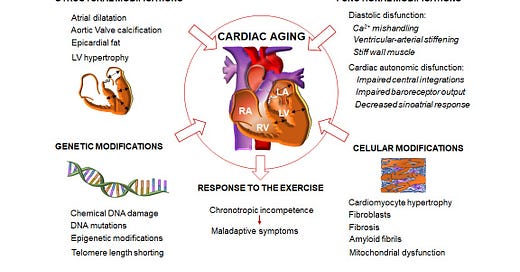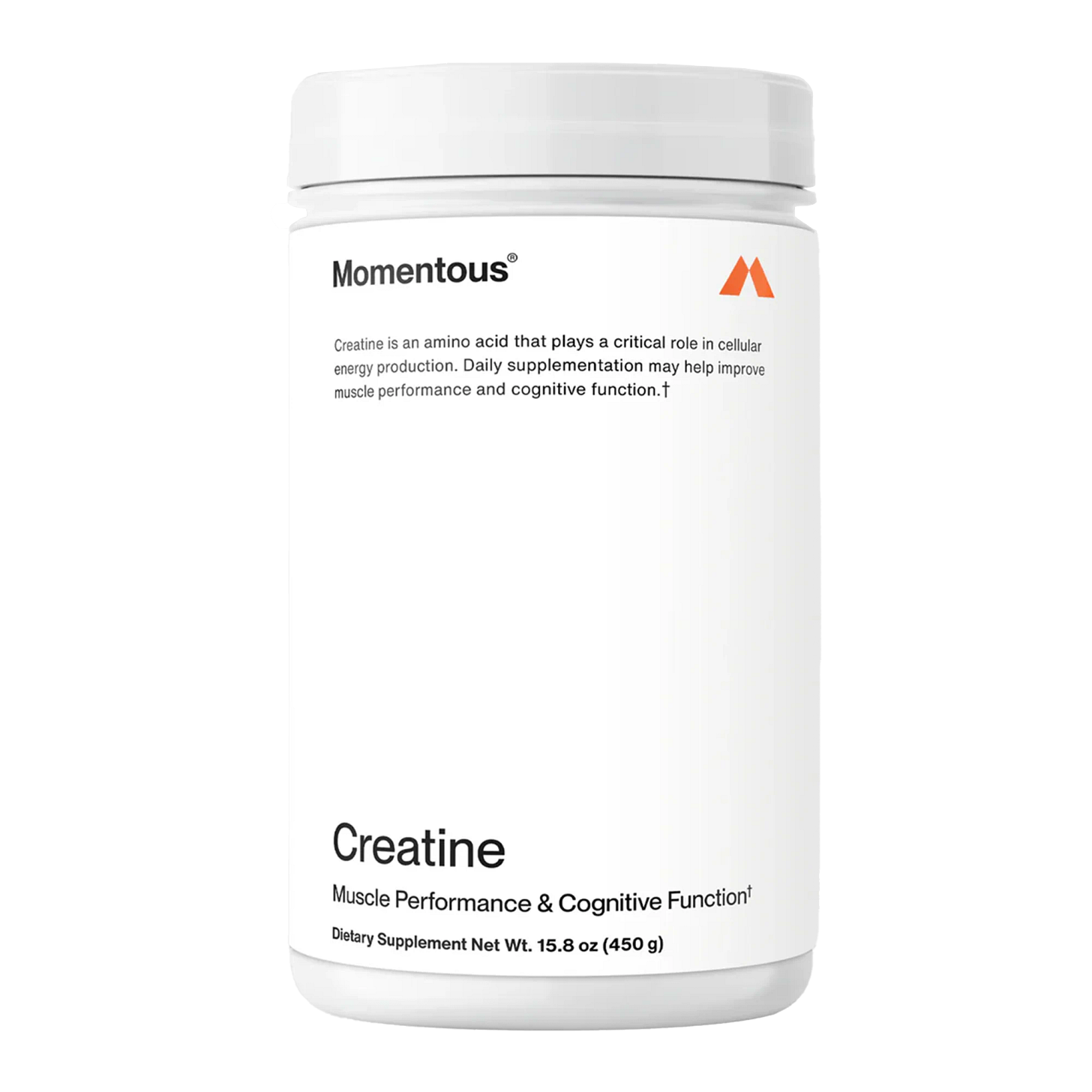Neuro Athletics is a 2 x weekly newsletter that breaks down the medical and scientific practises that you need to perform at your peak. Subscribers include professional athletes, athletic trainers, coaches and casual fans. So if you are not already a subscriber, sign up and join 68,000+ others who receive it directly in their inbox each
Story at a Glance:
Your Heart Ages Faster Than You Think: By your 40s and 50s, your heart's elasticity declines, your arteries stiffen, and your risk of heart disease skyrockets. But you can fight back with the right exercise plan.
Exercise Is Non-Negotiable: Research shows that working out 4-5 days per week is the minimum dose needed to protect your heart from aging. Less than that? You’re rolling the dice with your future health.
Rewind 20 Years of Aging: Dr. Benjamin Levine’s two-year exercise protocol reversed 20 years of cardiovascular aging. Think of it as a heart health reset—no prescription drugs required.
Neuro Athletes,
Alright, ladies and gentlemen, let’s talk about your heart. Not in the “romantic getaway” kind of way, but in the “do you want to still be crushing life in your 80s?” kind of way. If there’s one thing I know, it’s that your heart isn’t just there to keep you alive—it’s the engine driving your entire performance in life.
And guess what? Just like that luxury car you dream about, if you don’t maintain it properly, it’s going to break down.
Harsh? Maybe.
True? Absolutely.
Here’s the deal: If you think a couple of 20-minute strolls a week are enough to stave off heart disease, I’ve got some bad news. Research from Dr. Benjamin Levine (Levine et al., 2018) tells us that you need to be doing a whole lot more.
And before you say, "But I don’t have time," let me remind you—your future self is either going to thank you or resent you. Your call.
The Aging Heart and Why Exercise Matters
As we age, the structure and function of the heart change in ways that can significantly impact cardiovascular health. The heart becomes less elastic, the walls of the left ventricle thicken, and the arteries stiffen, all of which contribute to an increased risk of hypertension, heart disease, and reduced aerobic capacity. Research by Dr. Benjamin Levine (Levine et al., 2018) and his colleagues has provided crucial insights into how exercise can mitigate these age-related cardiovascular changes, helping women in their 40s and 50s maintain youthful heart function.
The Power of Exercise in Preventing Heart Aging
Levine’s research on Master’s athletes—people who keep training like beasts well into their golden years—shows that their hearts look like those of healthy 30-year-olds (Levine et al., 2018). Yes, you read that right. These 60-year-olds have hearts that function as if they were three decades younger. The best part? You don’t need to be an elite endurance athlete to get similar benefits. But you do need to train more than you probably are right now.
The Exercise Dose That Preserves Cardiovascular Health
Levine’s studies (Levine et al., 2019) investigated how different exercise frequencies influenced heart structure. His research divided participants into groups based on the number of days per week they exercised and revealed that:
Exercising only 1-2 days per week provided no significant protection against heart aging.
Exercising 2-3 days per week offered some benefits but was not sufficient to fully maintain heart structure.
Exercising 4-5 days per week was the threshold for significant cardiovascular protection.
Exercising 5-6 days per week provided near-complete protection, with heart structures similar to those of Master’s athletes (Levine et al., 2019).
So, if you’re only hitting the gym twice a week, you might as well be watching Netflix. You need at least four to five days of exercise per week to maintain your heart’s youthfulness.
Reversing 20 Years of Heart Aging: A Two-Year Exercise Protocol
Levine’s most influential study (Levine et al., 2018) involved a two-year intervention trial in which sedentary 50-year-olds were placed on a structured exercise regimen. After two years, their heart structure had reversed 20 years of aging. That’s like getting a cardiovascular facelift—without the surgery.
The exercise regimen included:
1 session per week of high-intensity interval training (HIIT), such as a Norwegian 4x4 session.
1 long aerobic session (at least 60 minutes of Zone 2 training), such as brisk walking, cycling, or jogging.
1-2 additional moderate-intensity aerobic sessions (30+ minutes each).
2 days per week of resistance training to maintain muscle mass and metabolic health.
Recovery days following intense sessions, because even machines need maintenance.
How to Apply These Findings to Your Training
For women in their 40s and 50s, the key takeaway is that exercise should become a non-negotiable part of daily life, much like brushing your teeth. A well-structured routine based on Levine’s "Prescription for Life" might look like this:
Monday: 30-minute aerobic session (brisk walk, jog, cycling)
Tuesday: Strength training (full-body resistance training)
Wednesday: HIIT session (interval training such as 4x4s)
Thursday: Recovery walk or light movement session
Friday: 60-minute Zone 2 aerobic session (cycling, swimming, hiking)
Saturday: Strength training and additional aerobic work
Sunday: Active recovery (light yoga, walking, or mobility work)
Today’s Newsletter Is Brought To You By Momentous
I've incorporated Momentous Creatine into my daily regimen to boost brain function, enhance muscle strength, and support overall well-being.
One of the biggest benefits of creatine is its ability to support cognitive health and reduce the risk of age-related cognitive decline. Starting around the age of 40, individuals may begin to experience a gradual decline in cognitive abilities, impacting memory and mental sharpness.
By supplementing with creatine, you can support brain function, improve mental clarity, and maintain cognitive health as you age.
The best part?
Momentous has by far the most rigorous commitment to quality, demonstrated by expert partnerships and strict third-party testing, making their products a reliable choice upheld by top athletes and health professionals.
The Harsh Reality: Exercise Is More Important As You Age
Listen, I get it—exercise gets harder as you get older. Your joints ache, your schedule is packed, and your couch is calling your name. But here’s the cold, hard truth: The older you get, the more you need to move. The ability to reverse cardiovascular aging diminishes significantly beyond age 70, meaning if you’re in your 40s or 50s, now is the time to get serious (Levine et al., 2021).
Additionally, research shows that when you stop exercising, your heart function plummets fast. That means every time you skip a workout, your body takes a step backward. Consistency isn’t just important—it’s everything.
The Bottom Line: Make Exercise a Lifelong Habit
The science is clear: If you want to keep your heart pumping strong well into your later years, four to five days of exercise per week is the price of admission. And don’t wait for a heart scare to take action—start today. Because the reality is, you’re either training for longevity, or you’re training for a future of hospital visits and medications. Your choice.
Let’s go!
References:
Levine, B.D., et al. (2018). "Effects of Long-Term Endurance Training on Left Ventricular Structure and Function." Journal of the American College of Cardiology.
Levine, B.D., et al. (2019). "Dose-Response Effects of Exercise Training on Cardiovascular Aging." Circulation.
Levine, B.D., et al. (2021). "Cardiac Adaptation to Exercise in Middle-Aged and Older Adults." European Heart Journal.










It’s an inconvenient truth but certainly achievable if desired. P.s. just got off the bike and cold plunged
Such a good an true message today! I wanted to comment to say I like the format of this newsletter with the sponsor's ad lower down on the messaging. It makes it easier to read the study while also viewing the advertiser after I've had a minute to digest the information!